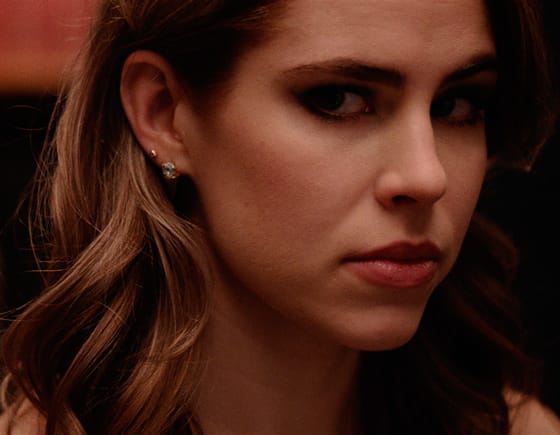Body starts with a familiar setup: Three young, archetypal women — the sweet one, the funny one and the hot one — decide to take their Friday night fun to a seemingly abandoned mansion, and everything goes horribly awry. In execution, though, it subverts a lot of genre tropes in surprising ways. It's quiet, and consists almost entirely of heated discussions amongst three female leads who are given ample screen time to develop expanded characterizations, and while the plot does stretch itself a bit thin, coasting on the strength of its premise, it's a neat one, if a little slow and scare-free for diehard horror buffs.
Best friends Holly (Helen Rogers), Cali (Alexandra Turshen) and Mel (Lauren Molina) are having a laid-back evening of snacking and pot-smoking after returning home for Christmas. Unconvinced that this is how their first Friday night back should be spent, Cali convinces her buddies to take the party to a cool abandoned mansion that apparently belongs to her out-of-town uncle. When it becomes obvious that the house actually belongs to some strangers, the crew is surprised by a knock on the door, and the night takes a turn for the worse.
Coming in at just over an hour, Body is, smartly, just long enough to sustain its setup. Any longer, and it could have been slow and uneventful — even as it is, the film's three leads, while convincing, likeable and well-developed (especially Rogers, who lent a much-needed, humanizing air to the premise-driven anthology horror V/H/S), aren't quite good enough to sustain so many terse and frantic arguing. This was a script written for actors who can give master classes in monologues, and unfortunately, these leads aren't up to the task.
There's an undercurrent of violence buried just beneath the surface in Body, which ends up being a mixed blessing; it allows the film to retain its air of quiet desperation and tension, but not a lot actually happens to hold our interest for prolonged periods of time. But while it's not a parody in the truest sense of the word, Body's biggest strength is how it slyly smirks at the genre. A potentially tasteless plot point I won't give away here is handled with a surprisingly insightful take on the role of violence against women in horror films, and while never overt, the film calls attention to how often elements like sexual assault are tossed into the horror mix with alarming casualness.
What makes Body so unique is that its primary narrative is entirely grounded in a question that could serve as the motto for thousands of horror films: "So what do we do now?" An aspect of slasher horror that's so appealing is yelling at wooden characters that stand around making terrible decisions while the viewer shakes their head in disbelief. Body is what happens when the viewer is present for every part of the decision-making process, from initial incident to its final, bleak conclusion.
(levelFILM)Best friends Holly (Helen Rogers), Cali (Alexandra Turshen) and Mel (Lauren Molina) are having a laid-back evening of snacking and pot-smoking after returning home for Christmas. Unconvinced that this is how their first Friday night back should be spent, Cali convinces her buddies to take the party to a cool abandoned mansion that apparently belongs to her out-of-town uncle. When it becomes obvious that the house actually belongs to some strangers, the crew is surprised by a knock on the door, and the night takes a turn for the worse.
Coming in at just over an hour, Body is, smartly, just long enough to sustain its setup. Any longer, and it could have been slow and uneventful — even as it is, the film's three leads, while convincing, likeable and well-developed (especially Rogers, who lent a much-needed, humanizing air to the premise-driven anthology horror V/H/S), aren't quite good enough to sustain so many terse and frantic arguing. This was a script written for actors who can give master classes in monologues, and unfortunately, these leads aren't up to the task.
There's an undercurrent of violence buried just beneath the surface in Body, which ends up being a mixed blessing; it allows the film to retain its air of quiet desperation and tension, but not a lot actually happens to hold our interest for prolonged periods of time. But while it's not a parody in the truest sense of the word, Body's biggest strength is how it slyly smirks at the genre. A potentially tasteless plot point I won't give away here is handled with a surprisingly insightful take on the role of violence against women in horror films, and while never overt, the film calls attention to how often elements like sexual assault are tossed into the horror mix with alarming casualness.
What makes Body so unique is that its primary narrative is entirely grounded in a question that could serve as the motto for thousands of horror films: "So what do we do now?" An aspect of slasher horror that's so appealing is yelling at wooden characters that stand around making terrible decisions while the viewer shakes their head in disbelief. Body is what happens when the viewer is present for every part of the decision-making process, from initial incident to its final, bleak conclusion.
